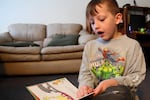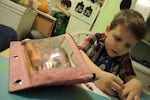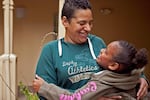Twice in the last year and a half, Gov. John Kitzhaber has staged a major announcement at Earl Boyles Elementary School.
This week, he announced his re-election bid there. A year and a half ago, Kitzhaber chose the school as the spot to introduce his now-departed chief education officer, Rudy Crew.
State officials highlight the school in the David Douglas district, because of its steps to improve early childhood learning.
OPB is tracking the progress of students who started kindergarten at Earl Boyles last year, not long after the governor brought Crew to visit. They're in the Class of 2025 – the class the state of Oregon aims to graduate at a 100-percent rate.
But not all will stay at Earl Boyles through elementary school. In fact, some have already left, as OPB's Rob Manning reports.
Six-year-old Sam Kennedy is reading on the living room carpet of his family’s new apartment.

Sam and his dad Roger
Amanda Peacher / OPB
Last year Sam was a kindergartener at Earl Boyles. This year he attends Centennial Elementary in Springfield. Sam and his family moved at the end of the summer.
He and his brother live with their dad, Roger, who moved because he wanted to be closer to his girlfriend and because he didn’t have a job in Portland.
"Obviously in the process of trying to find a job. It's one of the reasons I moved down here. It's a little better job market than in Portland," he says.
Earl Boyles doesn’t generally deal with a lot of student mobility.

Sam Kennedy reads from "Hop on Pop" by Dr. Seuss.
Amanda Peacher / OPB
District officials say the last time they ran the numbers, Earl Boyles was actually its most stable elementary.
And, a neighborhood analysis done by a Portland State researcher found more families near Earl Boyles stay put, than in the county overall.
But, nearly a quarter of last year’s Earl Boyles' kindergarteners are at different schools for first grade this year.
Some were only at Earl Boyles because of crowding at their neighborhood schools – so they've moved closer to home.
But a number of them, like Sam, left the area. Sam is adjusting, according to his aunt, Shoshanah Perkun.
"He's devouring books at a rate we can't keep up with. Fortunately, the public library is about a mile down the street," Perkun says.
Researchers disagree about whether changing schools makes a significant difference to academic performance.
Studies suggest frequent change can be toughest on kids who are poor, from minority backgrounds, or who live with a single parent.

And students who switch schools tend to have more behavioral problems.
Perkun says Sam's biggest issue is he's young for his class.
"It's just like an emotional issue at this point. He doesn't handle the disappointments as well. He doesn't handle not getting his option picked. He's like 'I want this book read' and when they pick a different book, it makes him sad," she explains.
Research also shows that students who change schools sometimes wrestle with fitting in, socially.
Sam says he sometimes struggles to get along with his new classmates.
"I really like when people don't be rude to me, but I hate it when people do be rude, because it's just not fair." Sam says he misses his friends at Earl Boyles. He's got friends who remember him, like Austin Clark.

Austin draws while his brother Kyle mixes a glass of chocolate milk.
Michael Clapp / OPB
"I painted a monster, now I have to draw a monster in crayon," Austin said one recent evening as he worked on a drawing at the kitchen table.
He's enjoying first grade at Earl Boyles. But he tells his brother Kyle, he misses Sam.
Austin: "Sammy was my best friend."
Kyle: "He calls him 'Sammy'."
Austin: "Because that's what he wants me to call him."
Austin's mom, Amber Clark, knows how he feels.
"He tells me about once a week how sad he is that Sam isn't here this year," Amber says.

Austin and his family plan to stay in their small apartment just so the boys can attend Earl Boyles Elementary School.
Michael Clapp / OPB
Austin Clark has been at Earl Boyles his whole school career.
He was in the fledgling preschool program when Kitzhaber visited with Rudy Crew in May 2012.
The Clark family – parents and three kids – live in a crowded two-bedroom apartment across from Earl Boyles Elementary. Dad, Bruce Clark, says it's not ideal, but they're not moving.
"We will keep our kids in that school, even if it means stuck living in this place until they get out of there. We've been really looking for a place to buy, and we can't find anything right here – it's not just the district – it's the school, in particular," Bruce says.
Students who stay put in their classrooms aren't immune to the effects of student mobility.
A study updated in 2011 suggests classes with high student turnover can be forced to do more review, so learning can be slow.
And for the kids who move, research indicates the effects can be hardest when families leave mid-year - as happened with more than 77,000 students at all of Oregon's public schools last year.

Kalani Fulmer
Amanda Peacher / OPB
Sam Kennedy moved over the summer. That's also the story with this former Earl Boyles student Kalani Fulmer who now attends Irvington School.
Kalani's mother, Jessica Fulmer, moved them to an apartment six miles from Earl Boyles, to be closer to her work.
For months, Kalani and her mom rode the bus to Earl Boyles.
In September, Kalani started at Irvington.

Kalani Fulmer with her mother, Jessica Fulmer.
Amanda Peacher / OPB
Jessica remembers tears on the first day. Kalani says it got better.
"I ended up making friends, one of the classmates - she said 'do you want to be my friend?' and I said 'nyess.' It was kind of fun," Kalani remembers.
Like Sam Kennedy, she lives with one parent. She also speaks of "rude" classmates.
She says the routines and rules at her new school are familiar. Well, not all of them.
"No talking over the person that is talking. Yes, I had a really hard time - really hard time," she says.
Jessica Fulmer says her daughter is caught up academically.

Amanda Peacher / OPB
Kalani feels as if she's behind in art. She says she doesn't draw as well as her classmates.
The Fulmers had one unexpected transition at the new school.
Kalani's teacher retired. Mom Jessica shakes her head.
"I'm kind of frustrated about that. For that to happen here, putting her, trying to keep her in a stable situation, and then what I didn't want to have happen, happened," says Jessica.
Fulmer hopes Portland Public will keep the sub they brought in and avoid further disruptions. The district says the Fulmers don't have to worry – the substitute teacher is going to stick around.
These class of 2025 reports are part of American Graduate— Let’s Make It Happen! -- a public media initiative to address the dropout crisis, supported by the Corporation for Public Broadcasting.
